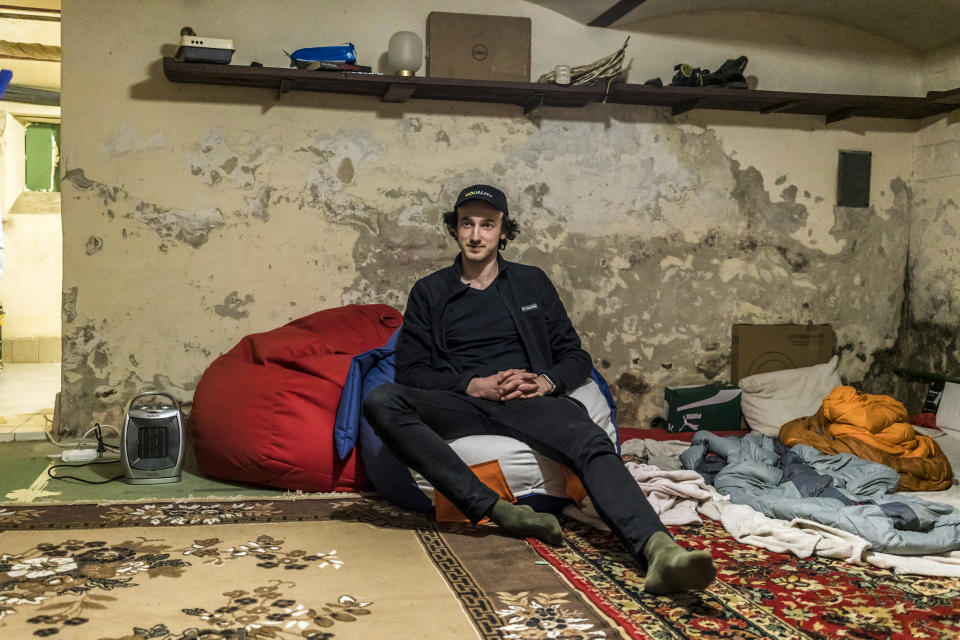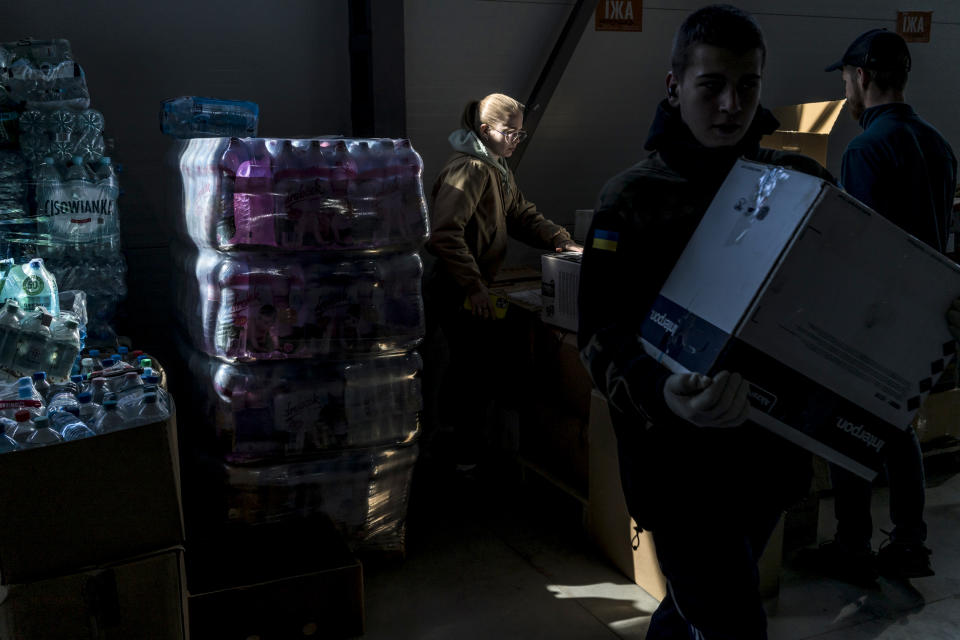Ukrainians far from the front lines drop everything to join war effort
LVIV, Ukraine — He once sold pots, cookie cutters and pizza pans. His company in this city in west Ukraine even sold metal wine racks to Ikea. But the war left Maksym Andrushchyshyn to contend not just with the existential threat of Russians invading his homeland, but with $100,000 of canceled orders and no regular business beyond the war effort.
Sparks now fly as the third-generation metalworker’s laser machines slice plates for bulletproof vests from Swedish or German steel, make dog tags to dangle from young soldiers’ necks and build metal braces for limbs broken in battle. A machine that once bent metal for round cake pans is now used to flex steel plates to the contours of a human torso.
Andrushchyshyn is using the 30 remaining employees at his metal workshop — he had 70 before the war — and his company’s leftover savings to make items useful to the war effort that he hopes will keep his home out of Russian hands.
“If Russian invaders come here, I understand there will be no business, there will be no life,” Andrushchyshyn said, noting that most employees are working for free as he struggles to pay the workshop’s rent and utilities. “This is a serious danger because they will not stop. This crazy Putin kills us like animals. We saw what he did in Bucha and other cities, and so we support our military. If they need us to stop here and go to war, we will go to war. Until then, we work every day, 24/7, through the night.”
Andrushchyshyn is like many Ukrainians here in Lviv: He may be far from the front lines of the war, but he is using his experience to do whatever he can to try to ensure that his country has some kind of edge in this conflict. It doesn’t stray far from his mind that about 30 of the Ukrainian soldiers he is hoping to help are employees who left their jobs at the workshop to fight.
While there are official military supply lines and organizations funneling goods throughout the country, individual Ukrainians are also taking up the cause to support their compatriots and the fight against Russia. Many have turned from their careers or pivoted their businesses to become logistics gurus or manufacturing hubs in support of the war effort.
They have built their own supply networks using friends, old connections in the United States and Europe, and a dedicated series of drivers to import goods or materials, so they can provide everything from metal spikes, tank hedgehogs and drones to night vision goggles, helmets and more. There’s also humanitarian supplies, food and even toys that Ukrainians are individually funneling to those in need.
Dmytro Zhluktenko’s recent side project has been to collect toys for displaced children who come through the Lviv train station, and his garage is full of goodies.

Zhluktenko, a 23-year-old software engineer who worked in marketing, collected more than half a ton of toys in recent weeks, a mix of plastic action figures and stuffed animals, which he hoped had brought some relief to Ukrainian children who have lost their homes and been scarred by the war. He’s organized a truck from Luxembourg to Lviv bringing another 20 pallets of toys, as well.
But his main passion is supporting the war effort. He has already used up about $40,000, the money he and his partner saved in hopes of opening a bike shop, to buy drones, batteries, mine detectors and other essential items to send to their childhood schoolmates who are now in the military. He quit his job to focus on this effort entirely, and he has raised another $50,000 through small donations over PayPal to help cover the costs.
“I’m not able to join the military, but I know that I can be most effective here,” he said, adding that his partner is able to keep working to support them while he dedicates himself to this logistics effort. “I just do what I can here to push the Russians out of our borders, to help people who actually do it.”
Zhluktenko has built a meandering supply line run by friends and acquaintances that stretches across central and Western Europe. He orders the gear to their apartments, and it’s then driven to the Polish border, where a few Ukrainian drivers bring it into Ukraine.
All the Ukrainian drivers are female. Ukrainian men between ages 18 and 60 cannot leave the country and thus are not able to carry the supplies.
Zhluktenko then packs everything up at his house in Lviv, sometimes from the bunker he built in the basement if an air raid siren rings. Typically, he adds a pack of cigarettes and some chocolates to each package.
When asked whether he believed the West should do more, so he and other individual Ukrainians didn’t have to shoulder so much of the burden, Zhluktenko shrugged.
“I don’t really care,” he said. “History will say who was the friend of Ukraine.”
Being on the right side of history has long driven Melaniya Podolyak.
But she didn’t expect her career to take her from working as a staffer in Ukraine’s parliament and political activist in Kyiv to operating a military and humanitarian aid warehouse for volunteer fighters.
Podolyak, who can often be found trying to stay warm in the warehouse she operates outside Lviv, wearing a Carhartt jacket and tugging on a vape, has a small volunteer force that she directs. These warehouse workers are doctors, architects, IT specialists, financial analysts and other professionals who have put their careers on hold or found time to work here during the war.
Though they lacked experience, together they’ve figured out how to efficiently empty trucks of boxes, organize supplies and repack buses headed for Kharkiv, Kyiv, Mariupol and other cities hit by Russian attacks.
While she said she couldn’t say exactly how she had gotten supplies to some cities under Russian occupation, she admitted she was part of a group that organized a drone to drop a satellite phone to defenders in Mariupol a few weeks ago.
“If I could, I’d ship them a tank,” she said.
But what irritates her is that Ukraine is still left pleading for help from abroad.
“I hate the fact that we have to beg for stuff — like we have to beg for jets, we have to beg for anti-aircraft systems, we have to beg for tourniquets, and the same goes for humanitarian supplies,” Podolyak said. “We shouldn’t have to beg. All of that stuff should be waiting for us.”
“I know the world doesn’t owe us anything, but they also kind of do for fighting,” she said.
It’s a burden that Ukrainians of all stripes have taken on, fluctuating between frustration with the West and working with their fellow Ukrainians to do what they can.

Just a short drive from Andrushchyshyn’s workshop on a side street on the city’s edge, Ihor Skalskyi and his employees at a light-show equipment and production facility take those steel plates that Andrushchyshyn’s employees cut and turn them into a finished bulletproof vest.
As there isn’t much need for laser light shows and fog machines these days, his employees — as well as a number of Kyiv workers who fled to Lviv and are sleeping on the third floor of the production facility — put a polyethylene and rubber coating on the plates to lessen the impact of a gunshot and then put them inside of Chinese-made vests Skalskyi buys in Poland.
Skalskyi is just above the age requirement to leave the country, turning 60 the day before the war started, so he can travel to procure the materials himself. He also works with people who would be his competitors normally.
“We have a Telegram channel for all the suppliers that provide the material that you need to complete one vest, and instead of competition, it’s more of a cooperation,” he said.
Together, Skalskyi and Andrushchyshyn have made thousands of bulletproof vests that can withstand rounds from an AK-47 and even a Russian sniper rifle.
Still, Andrushchyshyn is clear-eyed that his help alone won’t be enough. Bulletproof vests will help some soldiers, but it won’t change the outcome of the war — it won’t bring Ukraine a decisive victory.
That, he said, is dependent on the continued support of Ukraine’s international partners and the weapons and technology they provide. But Andrushchyshyn said he intends to keep working here in his metal shop until the bitter end — whenever that might be.
“I don’t know; we will do this until we can’t,” he said. “I think that’s what’s normal now.”
CORRECTION (April 29, 2022, 11:22 a.m. ET): A previous version of this article misstated Dmytro Zhluktenko’s age. He is 23, not 27.

